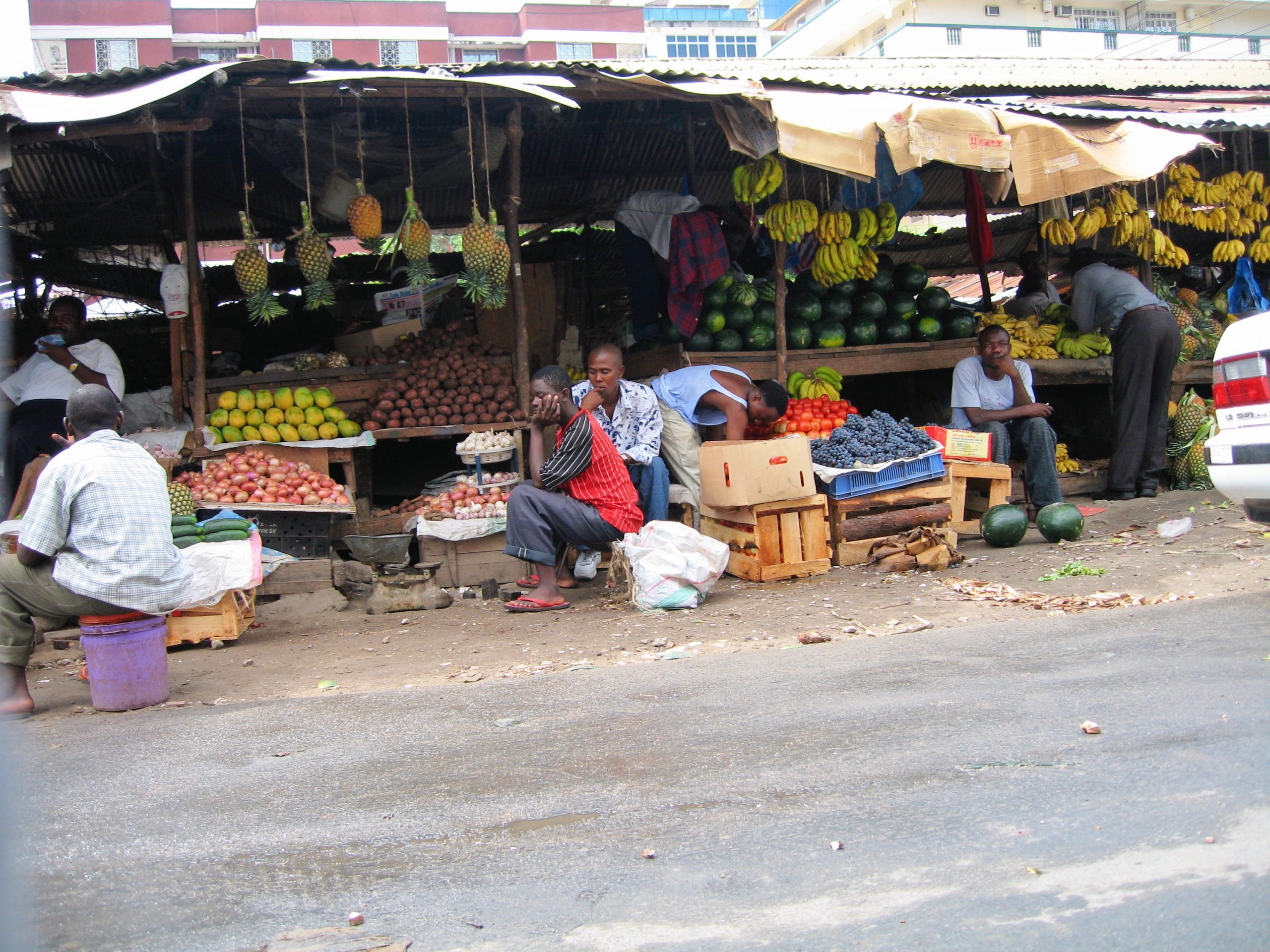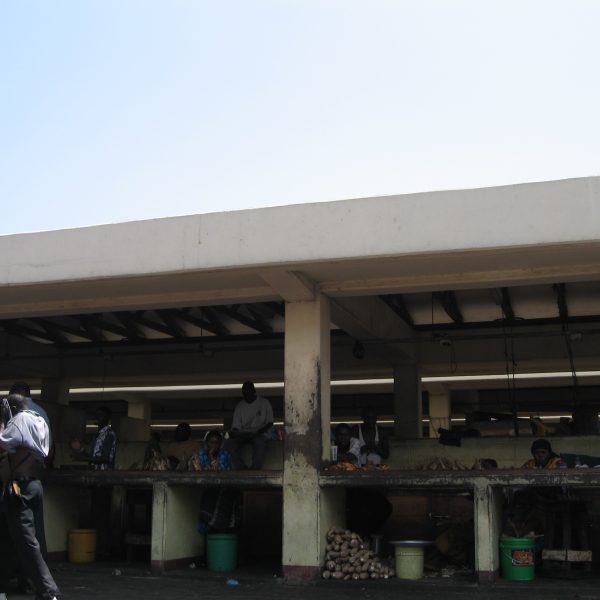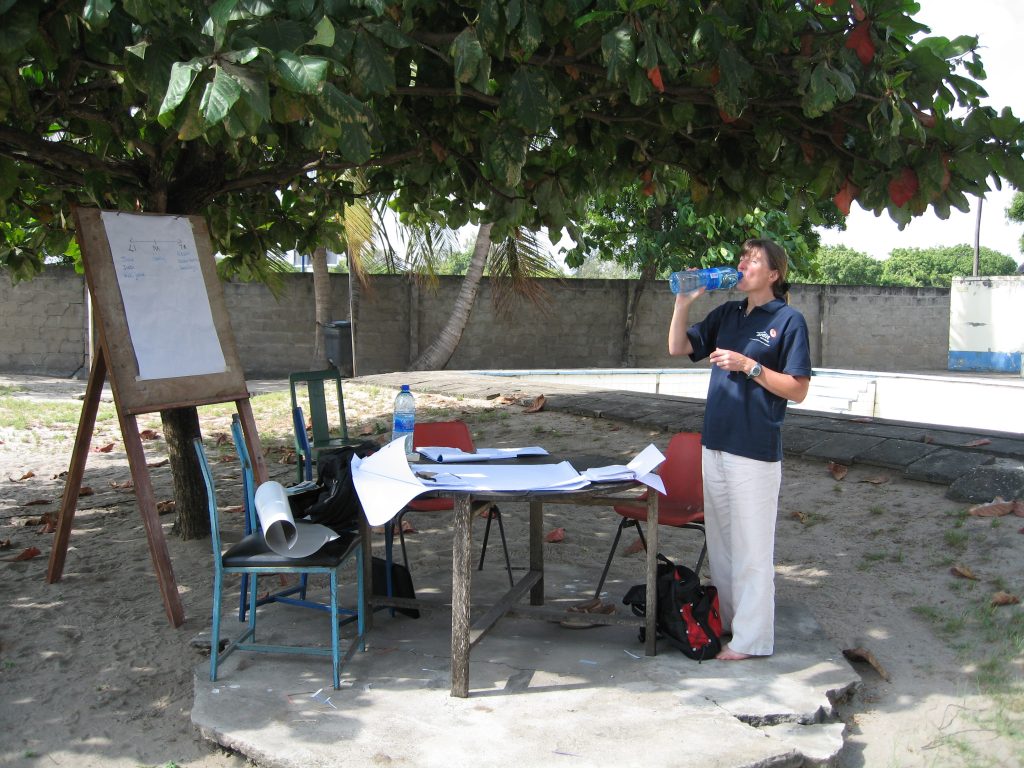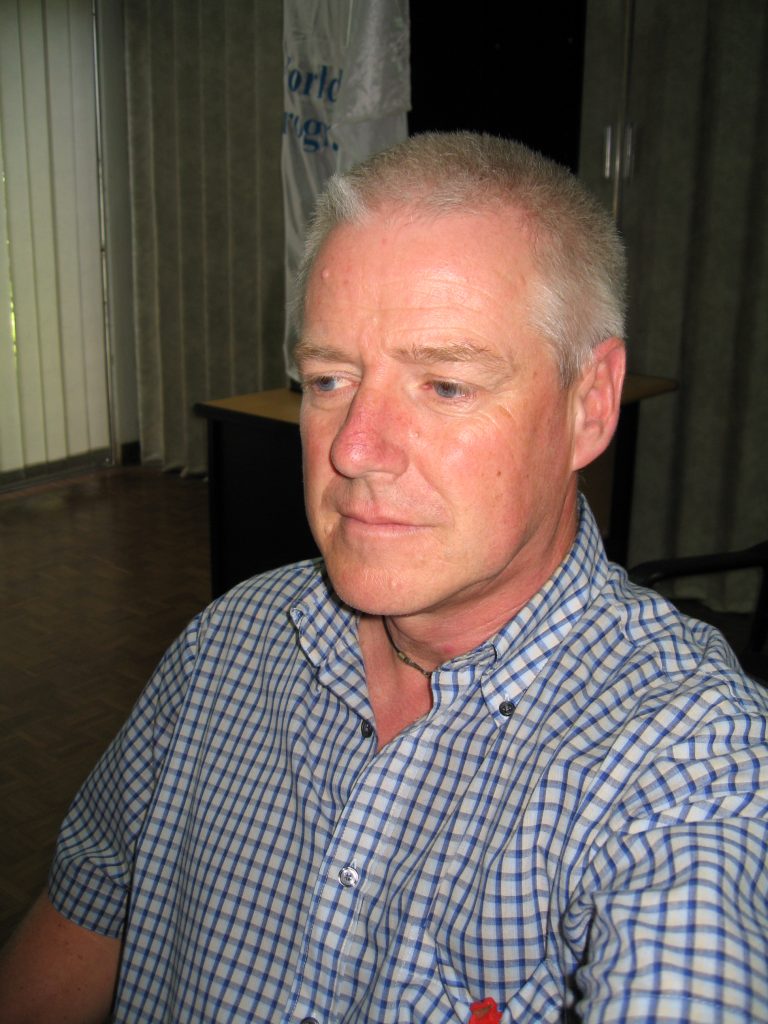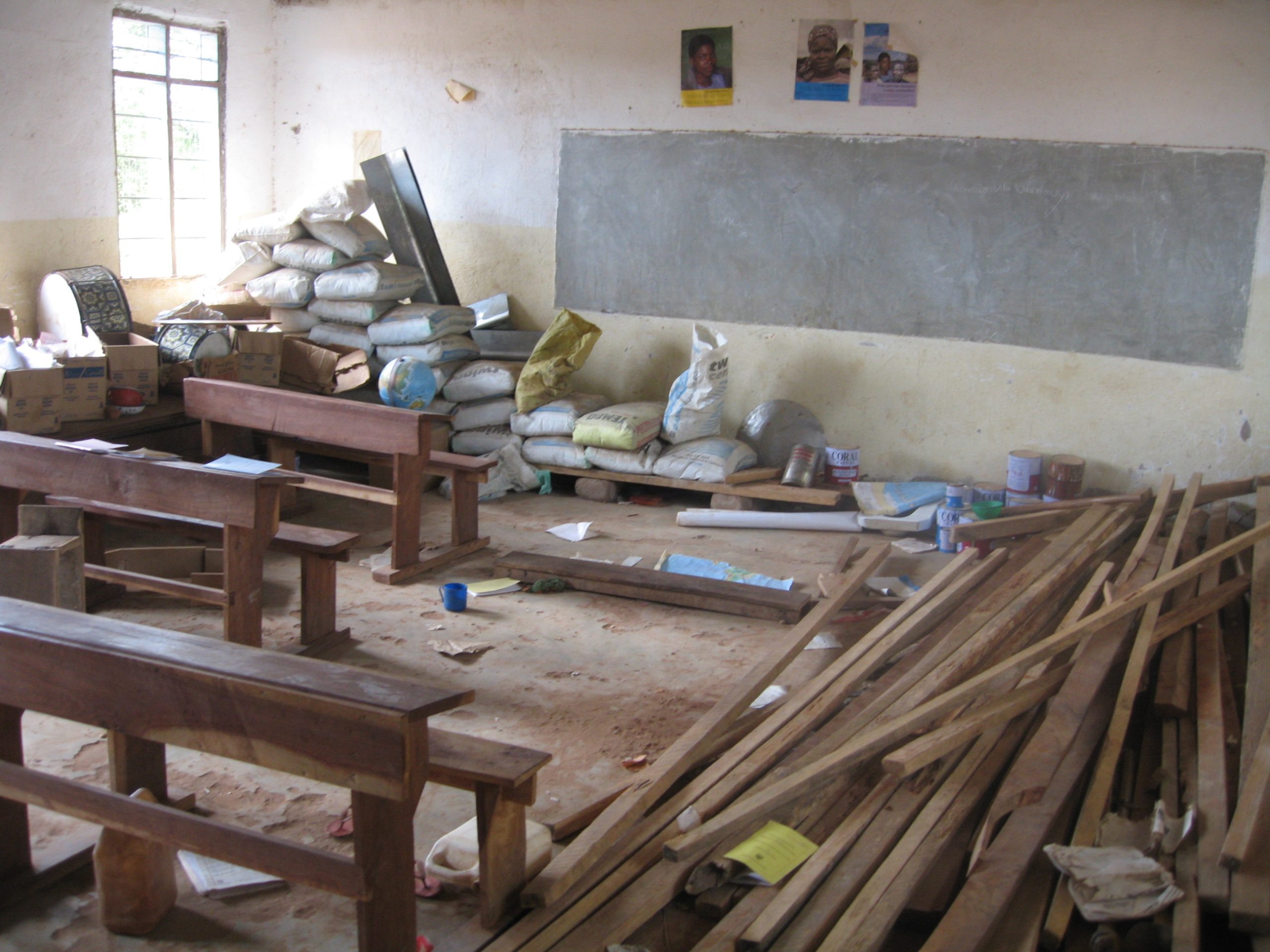![]()
Denna publicering uppdaterades den 24 februari, 2023
* Saturday January 21st, 2006 *
The training with UN WFP in Rome has finalized and now travelling to Tanzania. The Swedes are indeed a global travelling people, you meet them every where. On the same flight from Rome to Addis Ababa in Ethiopia I met some Swedes from Stockholm who where to visit Addis, while some other where going further in to Ethiopia. We arrive at Addis Ababa after a long flight and now we must split up as the Malawi team will take the flight to Lilongwe.
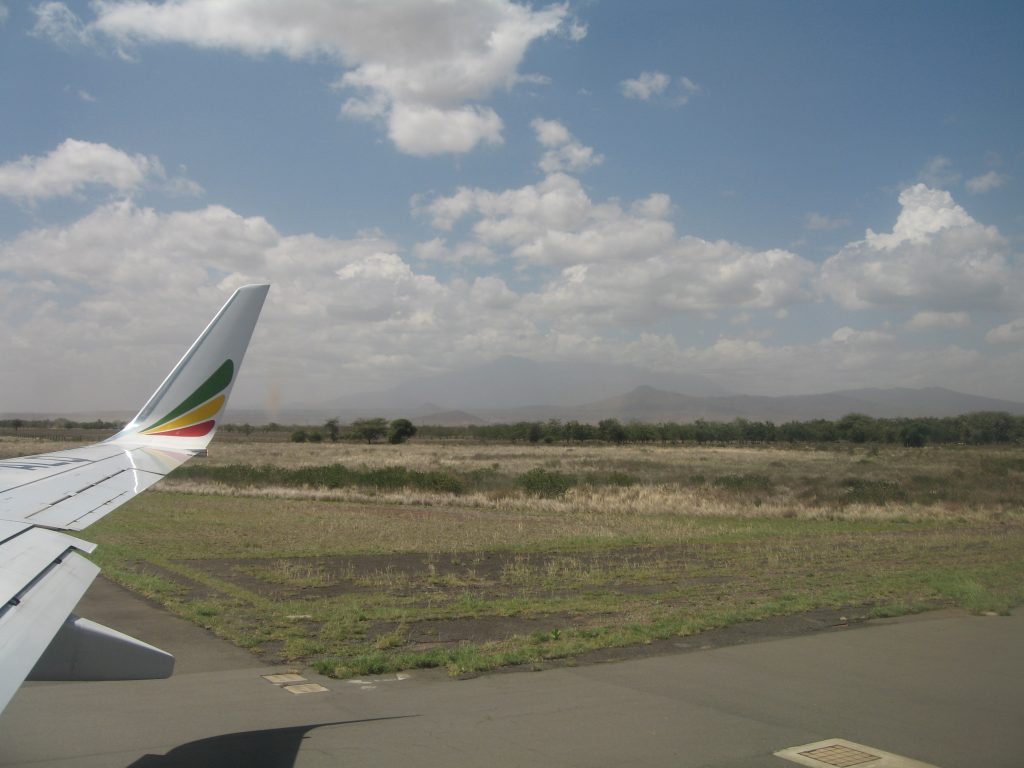
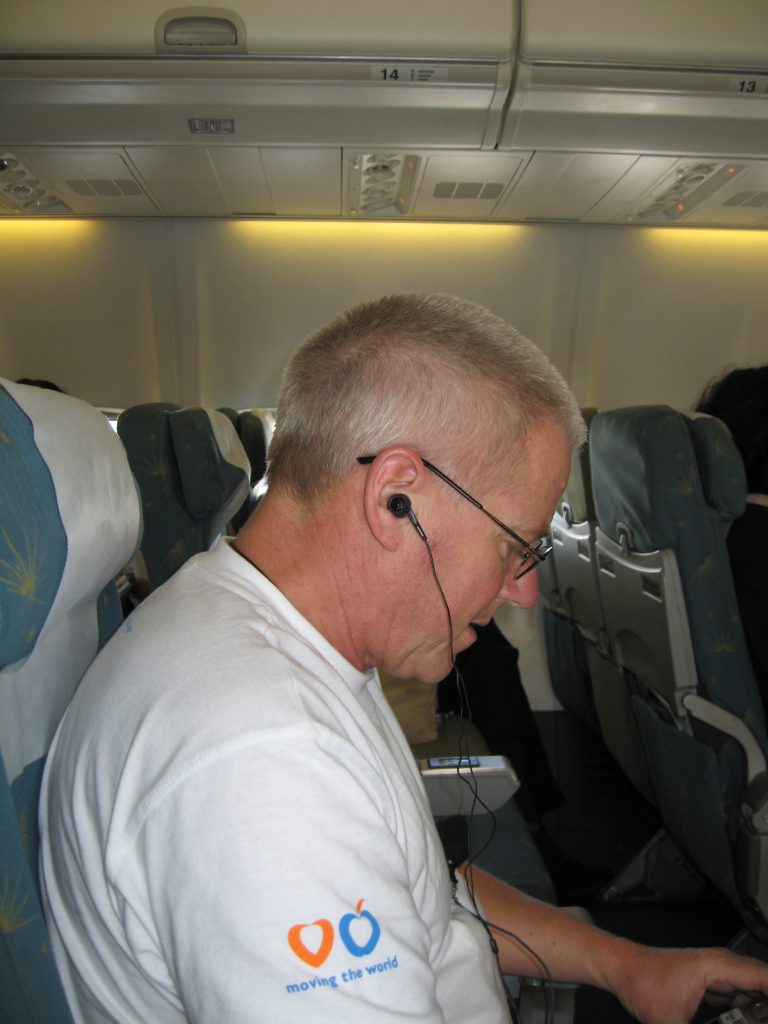
I discovered even more Swedes when cueing in the terminal, a group from Varmland… I and Janet pass the security check and we wonder if our baggage really will be transferred to our new flight as we had a late arrival. This was no problem as our flight to Dar es Salaam also was delayed. We had a stop at Kilimanjaro and a view of the mounting from the aircraft. At last we were approaching Dar es Salaam and when leaving the plane it was like entering a sauna. Only 28 degrees though, but with a humidity of 95% it feels like 40 at least… When queing up at the pass control check point at DAR airport I met another 2 girls from Stockholm, who will study at Mzumbe University in Morogoro for the next 5 months. We were picked up by the driver of UN WFP who took us to the Peacock Hotel, and it was nice to get inside a conditioned area again.

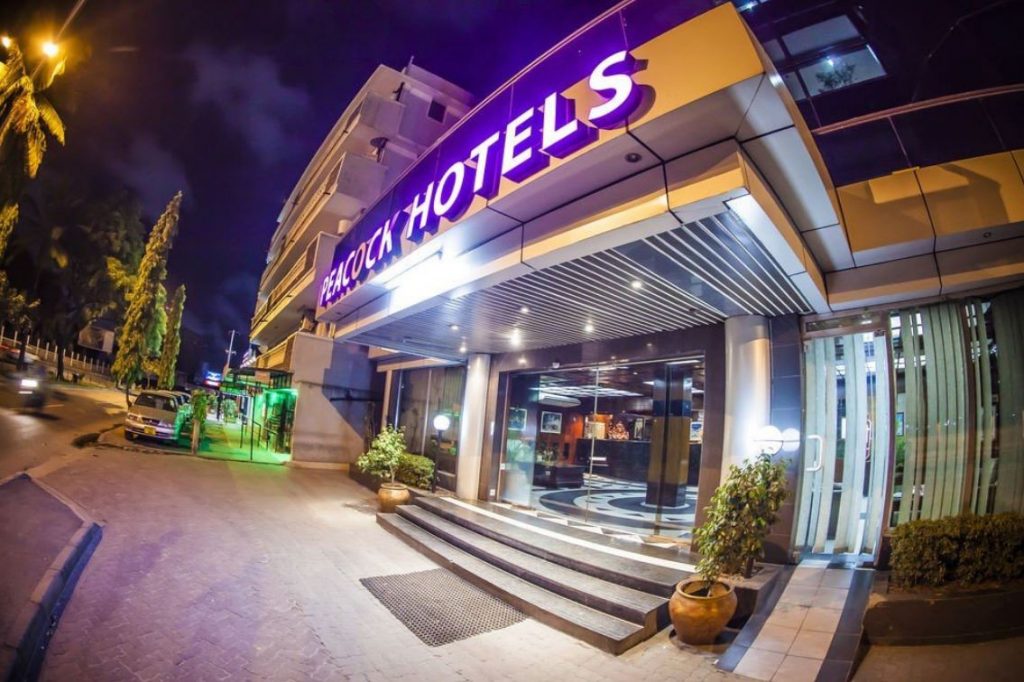
My body will need to have some more hours to get use to the extreme heat. But there is nothing to do about it than to get used with it, especially as we within a week are going to Dodoma where it is even hotter than in DAR. First thing to do is to have a COLD BEER. We had a walk in the surroundings and it is saturday and people gathering at churches and other religious places.
Went through the local markets where as some are concentrating in rice and beans while other concentrates in fruits and vegetables. But it is also very common that people selling what ever they have, it seems like everybody is selling something everywhere. The Tanzanian people are very friendly and like to say Jambo (Hello) and talk to a stranger, especially when having another color of the skin. Usually they stroll along with you and telling stories about the city, they like to be your guide and to earn some bucks. We also needed to exchange some USD into Tanzanian Shillings and visited an exchange office (CF Union Bank Limited) which had a led board on the wall showing the exchange rates, but when the man behind the desk noticed that two white people entered the room, he quickly changed the exchange rate on the led board, and guess what, suddenly the Shilling was much more expensive to buy.

We had a long walk and went down to Kivukone Front, the ferry terminal where the boats are leaving to Zanzibar. An uncountable number of people tries to sell tickets to you when passing, the road are quite crowded with people and traffic. Here you also will find small sheds selling everything and some have no sheds, they just standing there and holding their items. St.Joseph’s Cathedral (a Roman Catholic church built 1889) are located in this area and we went inside to take a look, many people were praying at different places inside and this day many weddings also took place.
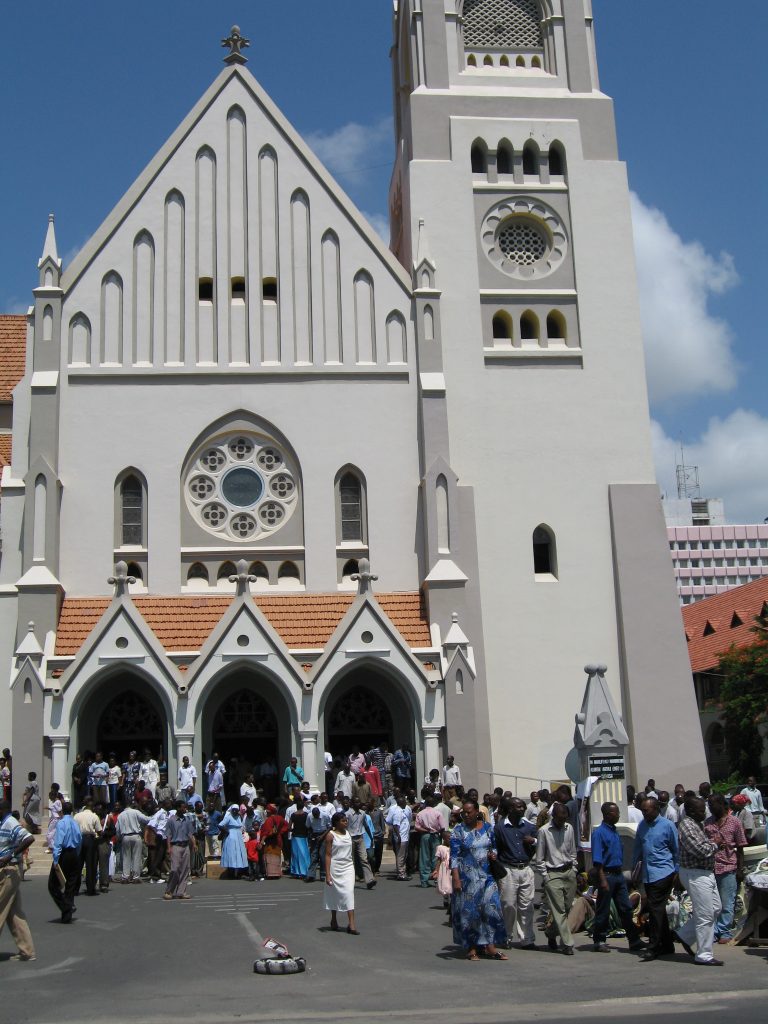
It seems to be common to drive in a convoy after the wedding ceremony, first a truck with an orchestra playing trumpets and drums, followed by the bride and groom often in a very nice and expensive car and the guests behind them in a more older car, every one using there horns from time to time.
Where Kivukone Road and Ocean Road meets, you will find the bus station and here you also can board the ferry across the harbor.
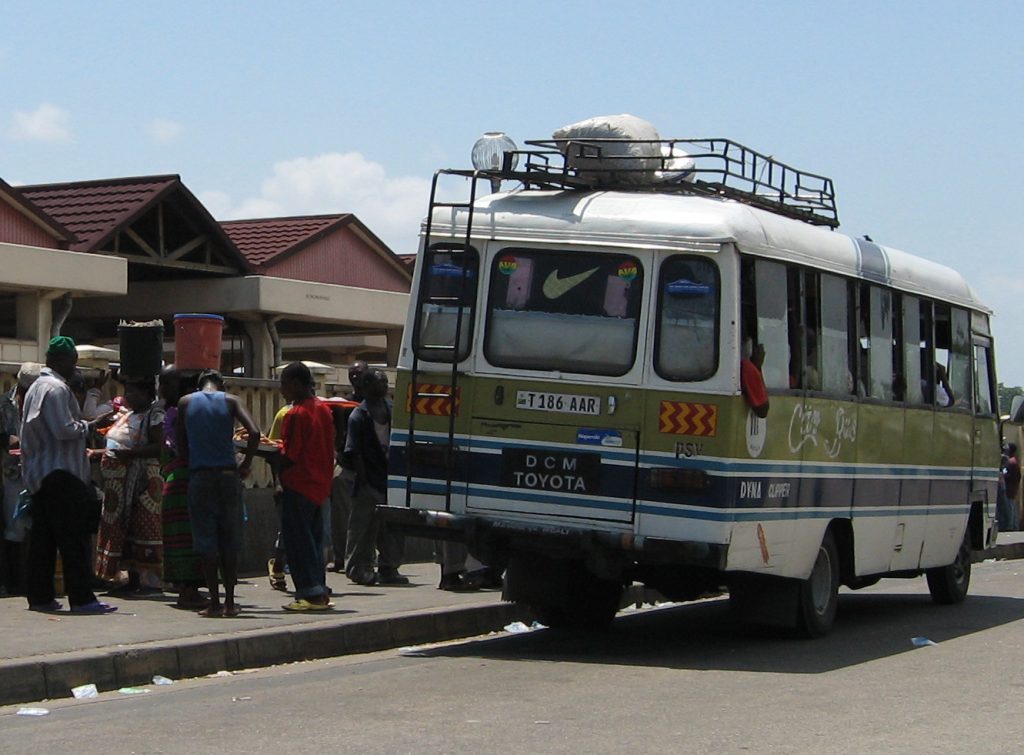
A huge amount of people are here as well and the fish-market is located nearby. You can’t miss that there is a fish-market due to the smell, no, it does not smell, it stinks in a way you cannot understand, you must be there. Here they cut fishes in pieces, cooking or frying them, not in ordinary pans that we are used to. No, they are using big buckets or whatever can be useful. Everybody is using firewood, imaging the smell combined with the smoke, and in the middle of this they are cooking and frying, must be 40-50 degrees there. Amazing…
click on pic to zoom
Funny enough, we began to be hungry in spite of this ugly smell, so we went
back to the hotel. Tonight they were having their “Peacock Grill Night” with music. We had a very nice buffet and the band that was playing was really good playing nice African music. At the buffe we had company with a bunch of guys from Iran who had climbed up the Kilimanjaro! Due to the long flight in combination with a long walk in the heat made us to go tobed quite early (before midnight)
* Sunday January 22nd, 2006 *
First thing to do today is to get a packet of water, but you better watch out. It is not appropriate to buy water everywhere. Finally, we found a good “store”. Inspired by the locals while walking home I carried the packet on my head as the natives do. This was appreciated and they smiled.
click on pic to zoom
Today we have a walk by the seaside again as we did yesterday, and visited the fish-market again to get some photos. After strolling along for a while we decided to grab a taxi. After negotiating a fare with the taxi driver we headed to Hotel Seacliff, an upper class hotel located north of the Upanga area. Lying on the cliff with a fantastic sea view, here we had a vegetarian lunch and water.

Incredible, how much water we are drinking. We drink approximately 3 liter per day to avoid dehydration. After some hour outside we get in to the lobby for reading the newspaper. Mpwapwa, one of the the places we are going to visit during our mission, are mentioned in the paper as they are hit hard by the drought causing massive hunger.
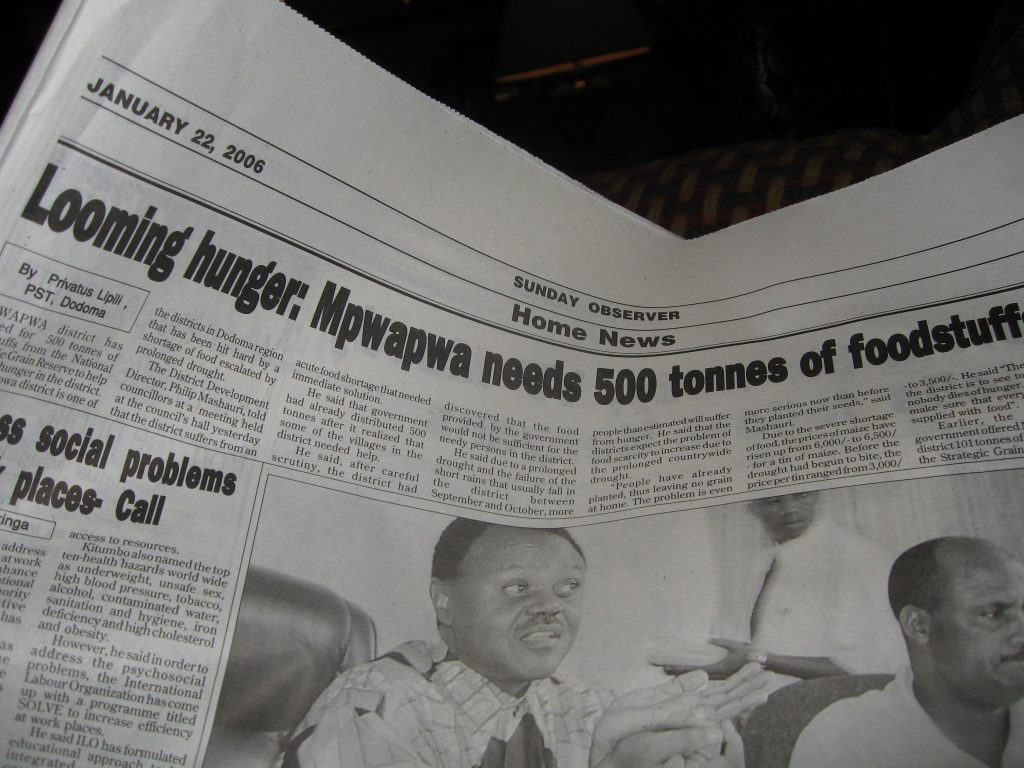
Mpwapwa are located southeast of Dodoma in the middle of nowhere, if you need company, this is not the place to go. Just a small village with nothing! In that area we will work for 4 weeks, constructing stoves at Mpwapwa primary schools. Back to our hotel again to get some rest, as it is now the hottest time of the day, something around 35 degrees and the humidity on top…
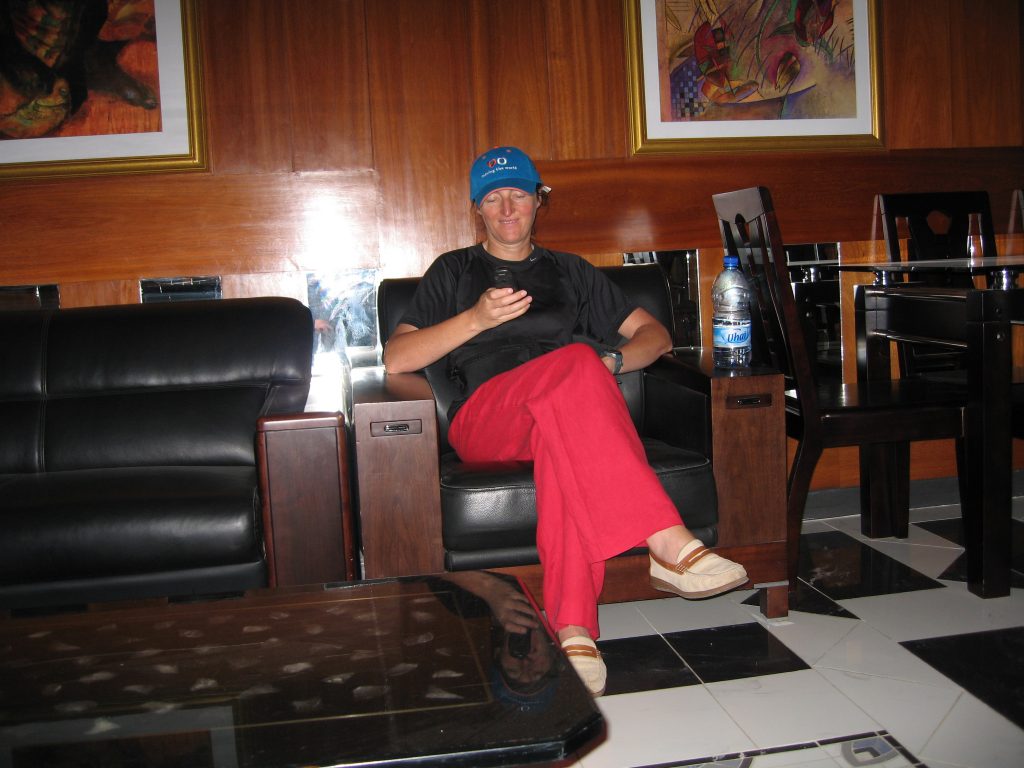
As I have grey hair (today it is more white!) and often is amongst the oldest when meeting people, I am called and titulated “Baba Kjelli”. The natives respects the elderly people and says this to the one who is of the age as their own father or older than they are. In official meetings this is very important and they always look and talk to “Baba”. They are considered not showing respect if they do not do this. After the rest I walked around again in the area alone to find another Internet café; the usual one where out of power (not un-usual). Found one but they charged 1000 shilling per hour so I walked on… but did not find any…
EVENING
We were both pretty tired due to the heat and the sunburn. Therefore we had dinner at the restaurant inside the hotel and went to bed early again. Do not know what I had on the plate, but I do look a bit peculiar…
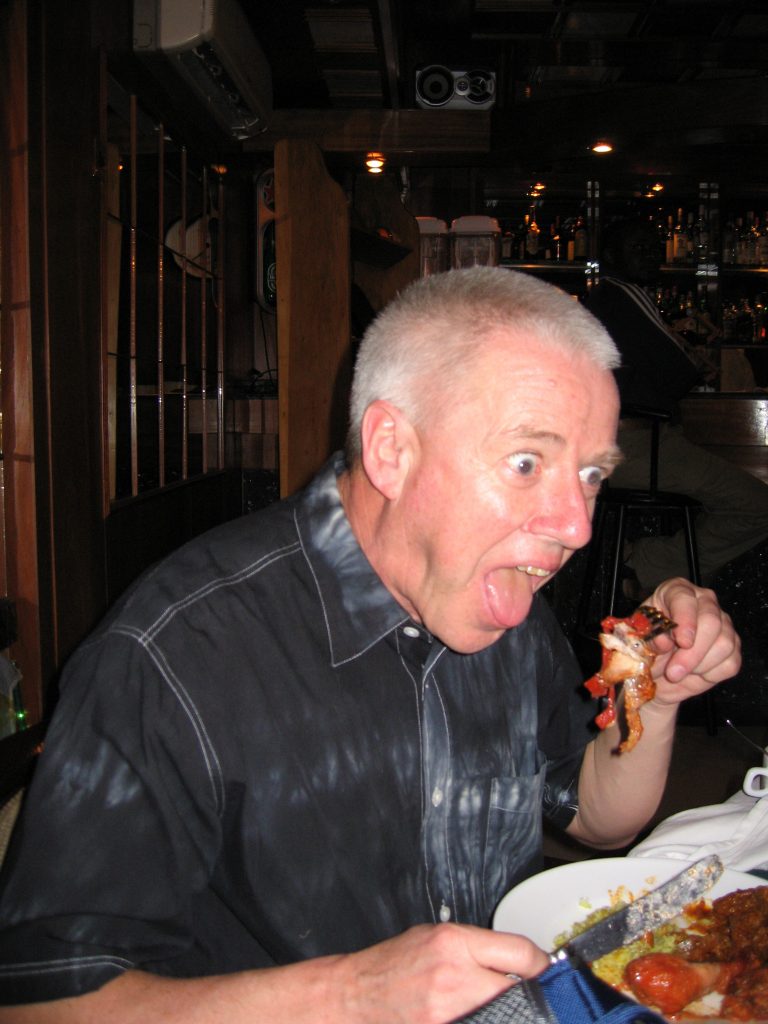
* Monday January 23rd, 2006 *
Today we are at WFP Country Office in Dar and several meetings took place.
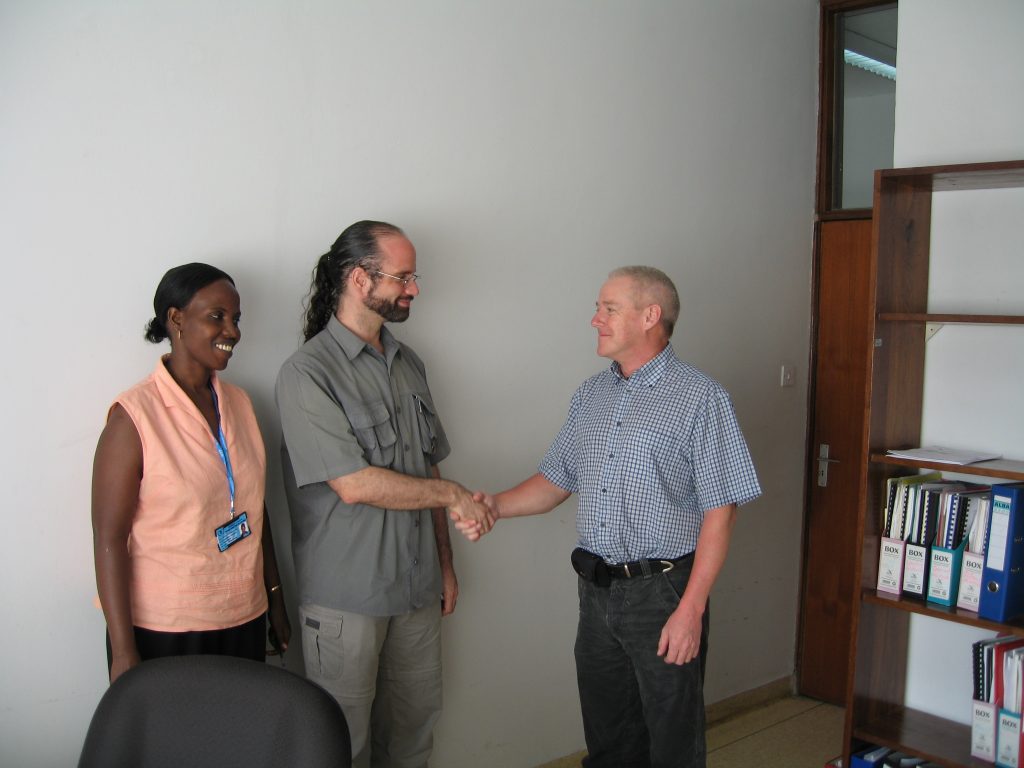
First meeting; Head of Programme, Mr Philippe-Serge Degernier.
Mr Degernier welcomed us and informed about the regions we are to visit and gave us some tips how to avoid Malaria amongst other things. We were also informed that reports from the schools are very important, i.e. how much food was delivered, how much used, how much left in stock. This must be done as the donors need to get a report of how their money is used. In some cases, the schools reports the first months of the year and then they do not. In those cases, much time is spent to push them. They need to be informed repeatedly about the importance of reporting.
Second meeting; Programme Unit (Programme Officers, Programme Officers Asst and Programme Unit Asst)
Every officer and assistant informed about their responsibilities and duties within their respective areas.
click on pic to zoom
Third meeting; Deputy Country Director, Mr Giancarlo Stopponi
Mr Stopponi informed what to expect and some of the problems raised by earlier volunteers. Valuable information was received, and actually confirmed what Janet and I had been speaking about. A kind of special mission was given to us specifically. After this meeting we had lunch at a very nice Indian restaurant in a kind of shopping mall, located in the middle of smaller sheds and houses where lot’s of activities of selling was going on.

Fourth meeting; Ministry of Education & Vocational Training
After lunch we paid a courtesy and talked to Fortunatis Kagoro and Mrs Ntunkamazima (not sure of position). We had a Brief discussion on School Feeding; class sizes (recommended 1-45 pupils). Training for teachers – accelerated program for 1 year and 1 year field training. The Challenges for schools. Number of new teachers per year is around 5000.
In the evening we visited the Internet café for updating the web site. The rate was only 500 shilling per hour. Sitting in front of the computer I understood why it was a low rate, you get what you pay for… Old computers and the bandwidth was zero, even opening Word as program took time and it was not possible to view my pictures as thumbnails. My main reason to be there was to upload pictures to our company site. I failed completely due to above. I’ve was very annoyed and left back to the hotel and went to the restaurant for dinner and then early to bed again.
* Tuesday January 24th, 2006 *
Today we had some more meetings at Samora Avenue/Zanaki Street some 20 minutes travel by car from the WFP Country office.
Meeting; UN Department Safety and Security (UNDSS)
Meeting with Mr. Kamala Stephano to have some security briefing. The information received was according to what we already learnt as we are holding a certificate showing that we successfully completed “Basic Security in the Field – Staff Safety, Health, and welfare.” I am proud to be a holder of such certificate as you do not need to do the exam again if you are going to work in the field elsewhere. Notable is that not all UN staff are holding this certificate.
Meeting with RPP, Mrs Karla Hershey responsible for Media and
Procurement.
Mrs Hershey is handling the procurement of the food and gave good examples of the job she is doing.

They are trying to buy both inland and internationally. If they only buy inland there will probably be shortages within the country and the prices in the market will increase, and this must be avoided. She also pointed out that it is very important that the donations arrive as early as possible. This because that sometimes she can buy to good price but as donation sometimes are late the prices has increased. The earlier the donation arrive, the possibility to get more food for the same money is bigger than if late arrival. She mentioned that there are problems with the two different kinds of maize, there are two sorts, white and yellow. The Tanzanians do not want the yellow one as they think that this maize is no good as it is not white. The maize has the same nutritional value though. Consequently, the white maize goes to the Tanzanians and the yellow to the refugee camps. WFP are trying to use “hammer milled” as much as possible, which means that the whole wheat is in the maize-flour to keep a high nutrition value. The only “problem” with this is that it must be eaten within 6 weeks, which means that this maize-flour not can be held in stock. The food is purchased on DDU basis (i.e Delivered, Duty Unpaid) basis to the delivery point. WFP uses sampling to control the quality of the food, the sampling are done by the company SGS and then sent to laboratory for test. Below are some basic figures, just to get a picture of the number of beneficiaries, food to be distributed and the related costs of doing this.

Mrs Hershey really gave us much information with thanks; the unit is doing a fantastic job. (A small note, she had a Swedish TNT World Map in the room, and we were invited for dinner at her residence on Saturday :-))
Meeting with Mrs. Nicoletta Capelli, HR/Administrative officer (also met Mr. John Jm. Wambura who is the Operations Assistant).
Mrs. Capelli has suggested to the Country Director that WFP should give us a SIM card to the mobile phone (Celtel) as there can be difficulties in some areas of Mpwapwa when using roaming SIM cards. This is really out in nowhere… Country Director has approved and we will receive one. HR will also take care of VISA problems (Janet might have an issue here), as well as to arrange the paperwork as we are going to visit the Masai schools, the Ngorongoro crater and Serengeti National Park (which not is within the program itself, more of a free time activity).
During lunch, which we had at the same restaurant yesterday, we took some additional passport photos as these were needed for the paperwork at HR.
After lunch we hade a meeting with Mr. Aramais Alojants, ICT Officer.
The department has 6 employees in Dar and 1 in Kigoma. The Dar office supports the local offices in Dodoma, Arusha and Isaka.
Mr. Alojants informed us that the satellite system will be installed shortly and this will enable the Dodoma office to have Internet connection with good speed. This is positive as we can go to WFP office (when in town) and use the Internet inhouse instead of an Internet café. We will also have our own personal WFP mail addresses, but these are only to be used internally, not for private use.
If we are facing any kind of ICT problem we should send a mail to tanzania.techsupport@wfp.org with copy to Mr. Alojants
We will also receive a briefing in Dodoma how to use the radio. The ICT contacts in Dodoma are; Mr. Neema Urase and Mr. Fradius Martin.
Meeting with the Logistics Unit, Mr. Carlos Mendes, Southern Africa Crisis Response Bureau for Southern Africa.
Mr. Mendes informed about the problems with the Tanzanian Railway which are going to be privatized. Some cars are 100 years old and break bulk cargo have arrived to its destinations, to some extent, damaged. A decision has therefore been taken, only to use containerized cargo when sending by rail. They are trying to minimize the transportation costs by sending by rail to Dodoma and thereafter by road via the Northern corridor which is towards the border of Rwanda and Uganda. The same goes for the Southern corridor which is towards the border of Burundi and the Lake Tanganyika. Deliveries for Arusha go by road only. When it concerns the School Feeding, they are distributing to around 500 schools.
EVENING
Again we were tired after a long day of meetings and meetings. We took a walk to buy some water and nearly got lost. It took us some time to find our way back until we arrive to the hotel again for dinner. Note, at 08.00 PM we noticed while walking that we had 30 degrees (and 95% humidity), I wonder what the temperature was during daylight. After a beer and nice buffet it was time to go to bed.
* Wednesday January 25th, 2006 *
Today is the day we will start or lessons in Swahili, but first we needed to go to the bank for cashing in some traveler’s cheques. The recommendation using traveler’s cheques was no good as we had much problems, without passport and the receipt when buying the cheques as well as not having a bank account at the bank caused us headache. The Finance officer at WFP helped us by calling the bank and explains that we were temporary UN staff and asked what to do. We were directed to a specific bureau de exchange located in the Movenpick house who also was an American Express agent. The exchange rate sign for USD had obviously been changed during our way to the office to a lower rate. They knew we were on the way and having problem so for sure, we were taken on a ride. Even though the rate was low, we now had more than 2, 5 million shilling. We sent most of it with our driver back to the Country office as they have a safe.
Emanuel, our driver took us to the Salvation Army where the lessons are to be held. Clarification, the lessons are not held by the Army, it is held by Swahili and Culture Ltd, who has an office there. On the way to the Army I took a picture of how women are carrying their stuffs, on the head.

The Swahili lesson was held, sitting under a tree during the first day for 6 hours. Our teachers name is Mama Jengo, an older and very nice woman who is trying to teach us Swahili. Today lesson was to learn how to greet people which are very important in Tanzania. We also tried to build sentences with the words learned, this is not easy. For instance, if you forget one character in a word it can easily have another meaning. For sure, my brain ran out of memory the last 30 minutes after such a concentrated day.
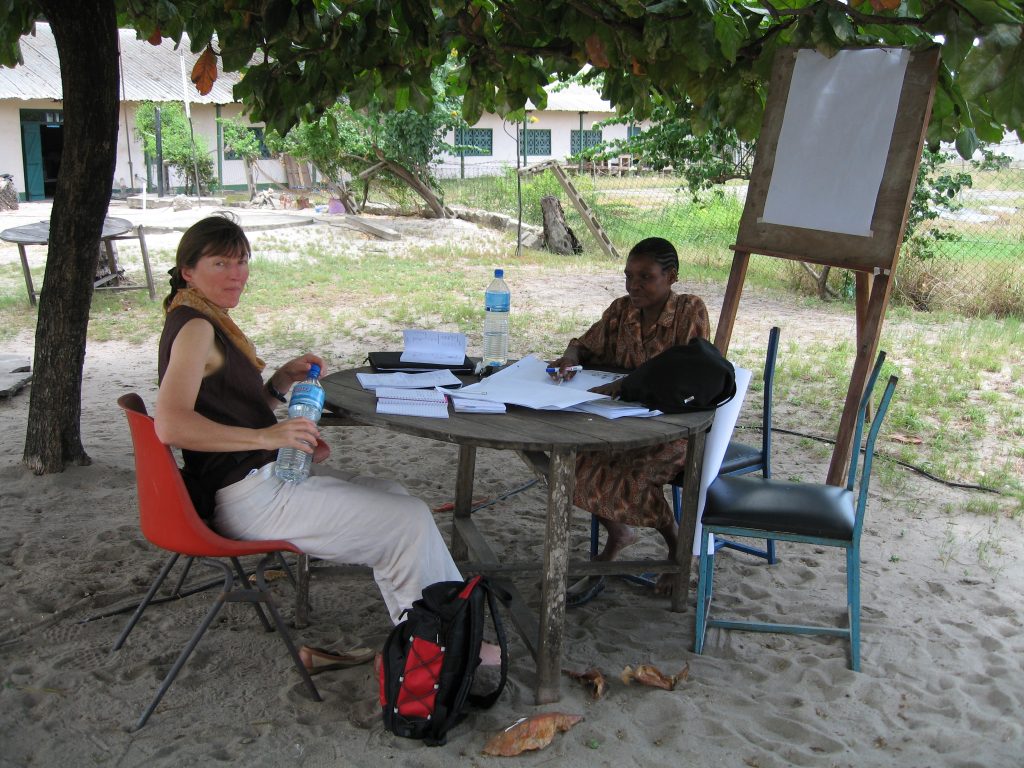
EVENING
Back home from the Swahili course some work were done in front of the computer screen. Janet took a walk to the internet café as she had some work to collect and send by mail. I joined her later and we downloaded the PDF Writer as this could be useful (we have only Adobe Reader installed on our computers). At 9.30PM we were back at the hotel again and went in to the restaurant. Tonight they had African Music Evening and we had good music and entertainment while eating. After dinner we joined the Africans on the dance floor to perform typical African dance. Everybody dancing in a ring following each other and sometimes one or two people are in the middle. Even some of the personnel joined the dance. This was a great evening.
* Thursday January 26th, 2006 *
Today is another day of more Swahili lessons held by mama Jenga. I must admit that she must have a great portion of understanding, listening to us
“Mzungo” trying to learn the Swahili word and it’s Grammatic’s. And the pronouncing of the words not to be forgotten. Janet is really good at it when it concerns to remember the words, but on the other hand, she is less fortunate when it comes to pronouncing and counting. But as a good team should be, we are supporting each other. The things she’s not good at, I am. What a team!
During the courses we could have the opportunity to have a nice bath in the swimming pool. But, as you can see, the pool is not in a good shape. And the
same is valid for the furniture outside. It is amazing that they do not keep things in shape in this country but also understandable as this cost money and better to spend them on more importan things!
This evening we were invited for dinner by WFP Country office. The driver (Emanuel) picked us up at the hotel as usual and we went to the Seacliff hotel. The very same hotel which I and Janet visited last Sunday. When we arrived, we saw Karla at the car park and thought that she also was to participate, but she was only there to do some shopping in the store.
The dinner took place in the Calabash restaurant, with excellent service and which is monitored by a South African family. Giancarlo and James from the
office participated and we had a fantastic dinner and a very nice small talk this evening.
* Friday January 27th, 2006 *
Our teacher had her daughter with her today as the school bus had left her behind, very cute and 9 years old. Learning Swahili is not an easy thing to do, especially when you are a grown up as I am. I wish I was much younger as the ability to learn quick and easy are so much bigger. But let’s not give up, we have to hang on in here… Hopefully we are learning all the time, our driver teaching us by asking questions in Swahili, the personnel at the restaurant in the hotel has begun asking us in Swahili. We just can’t get away from the language. This is really good and probably the best and fastest way to learn the language.
click on pic to zoom
After lunch we had a ride with one of the local buses to the market, which is one of biggest in East Africa. All buses are small and in a very bad shape, seats for approximately 12 people. Those buses had not been allowed in Europe. The market is enormously crowded, and you should be beware of the pick pockers. The stores, in some cases sheds are selling everything you can imagine. It was really amazing to walk around amongst the natives and feel the atmosphere, the smell, look at all the beautiful colors of the clothing’s.
We were invited by Karla Hershley for dinner this evening together with some friends of her. The friends was Christian from the WFP office and his girlfriend Hanna. Both of them from Norway. We were taken to Dar es Salaam Yacht Club which is located north of the city nearby the Oyster Bay. The road just nearby the yacht club was awful, lot’s of potholes and dust and the car was waving like crazy. Lucky enough no one got seasick. How would that looked like outside a yacht club ashore?
The Dar es Salaam Yacht Club is a very popular place and you need to be member, or a guest to a member to be able to get inside. You better be there early, before the dusk, otherwise you might not get a table. We were there before dusk but had difficulties to have a seat anyhow. The place has a wonderful sea view with the yachts anchored at the waterfront. Most of the visitors are “white” people; the prices are descent and the food / barbecue surely great. This we do not know as we only had a couple of beer at the club.
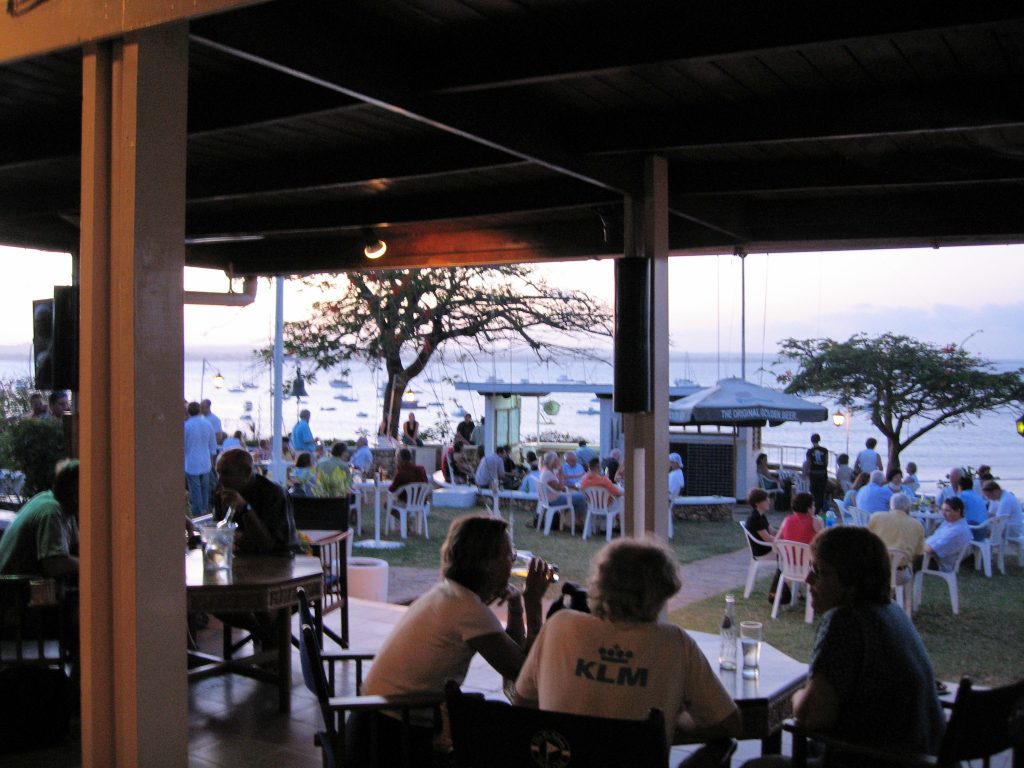
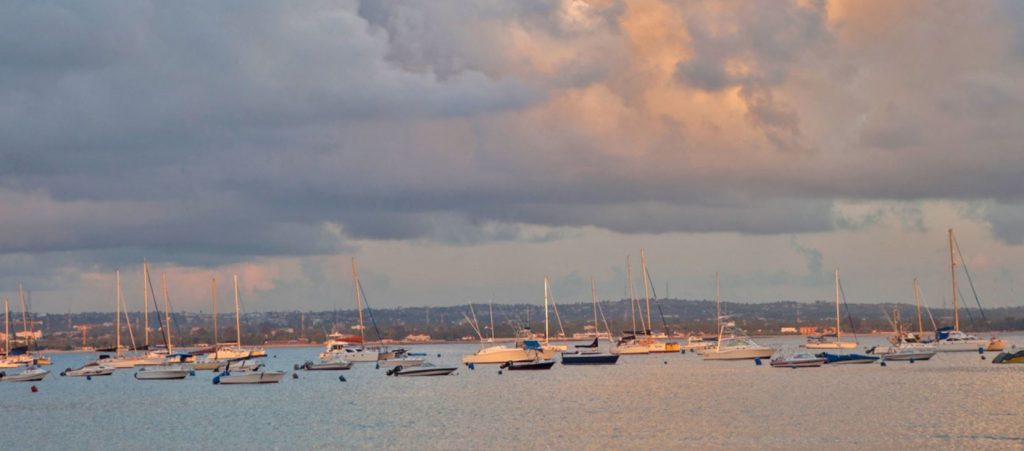
After the beer we went to one of the new popular restaurants of Dar es
Salaam at that time, “Hot Africa”. The restaurant is located not far away from the yacht club, but without sea view, though. They had excellent food. We had a very pleasant evening, talking about sailing, scuba diving and of course some job related discussions. Christian’s girlfriend have only been in Dar for a couple of months and were to take a certificate for scuba diving,
therefore the talk about scuba.
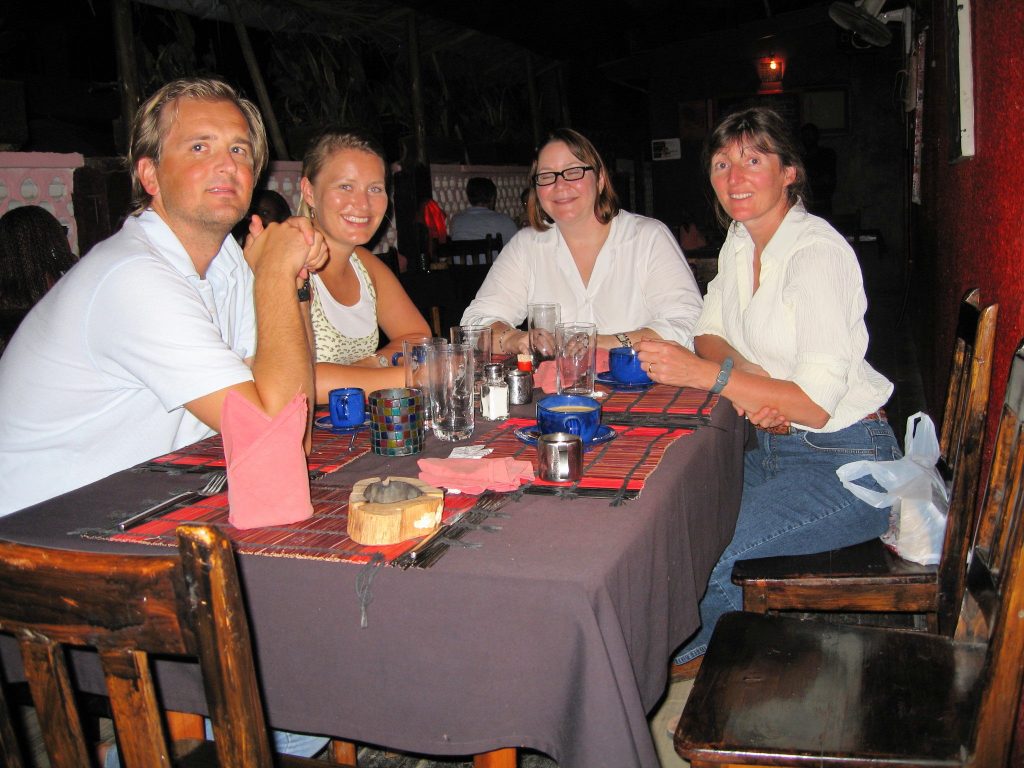
Karla invited us again, and told us that next time we will be in Dar we can stay at her house as she have extra rooms which we can use. She also invited us to go out fishing or scuba diving as she also was a diver. Very kind of her and we happily accepted. Karla was kind and gave us a lift back to the hotel after this very pleasant evening.
* Saturday January 28th, 2006 *
Swahili lessons again… and now it’s getting better, even if I have big difficulties to remember all the words, but we have patience. Not to mention the patience our teacher needs to have. Today we are having lessons before lunch and according to the agenda we were supposed to visit the Village Museum after lunch. But as we do need more practicing, we suggested that we instead could go to our hotel, have a cup of tea / coffee / soft drink and do some more practicing as we really needed this. For a couple of hours we were repeating some of the lessons.
EVENING
At 8.00 PM we had a walk down to the seaside the Kilimanjaro Kempinski hotel (today named as Hyatt Regency Dar es Salaam, The Kilimanjaro Hotel). The hotel is new, big and very luxurious. At the 8th floor they have a bar with lots of sofa’s, live music and a nice view over the harbor. We ordered some beer’s and got some snacks for free. Sitting in the sofa opposite us, there were two Norwegians; again we met Scandinavian people, amazing. We really enjoyed the atmosphere and had a good time.
click on pic to zoom
Suddenly the clock was midnight and it was time to get home. We took a walk through the streets (which is something two “Mzungos” not should do in the middle of the night…) the streets were very quiet, no traffic. Even though it was midnight, there are lots of people everywhere sleeping on a chair, in a car or in the street. Back at the hotel we immediately went to bed.
* Sunday January 29th, 2006 *
Swahili, Swahili, I will soon have nightmares about Swahili. Talking about nightmares, I am at present staying in a hotel having a double bed, what no one told me, was that the other bed was for the cock rogues! Woke up in the middle of the night with some of these sweeties in my bed, I had preferred someone else company though… And yesterday I had a coke, tasted well until I was to fill up my glass again. Out of the bottle came something which some ones says, “they are rich of protein”…:-( I do not really know what it was but it looked like a fly. Think we better get used to such “surprises”…

Tomorrow will be our last day of Swahili lessons and the day after we will travel by road to Dodoma, the distance is about 500 kilometer and is expected to take 8 hour. We will have meetings with several WFP units about the work to do. We will also have a discussion on the “Walk the World” plan in Dodoma. A walk will also take place at and on Mount Kilimanjaro. The ones who wish to walk and climbing the Kilimanjaro is expected to announce their participation as registration and tickets is needed in advance. I will report more about this later on.
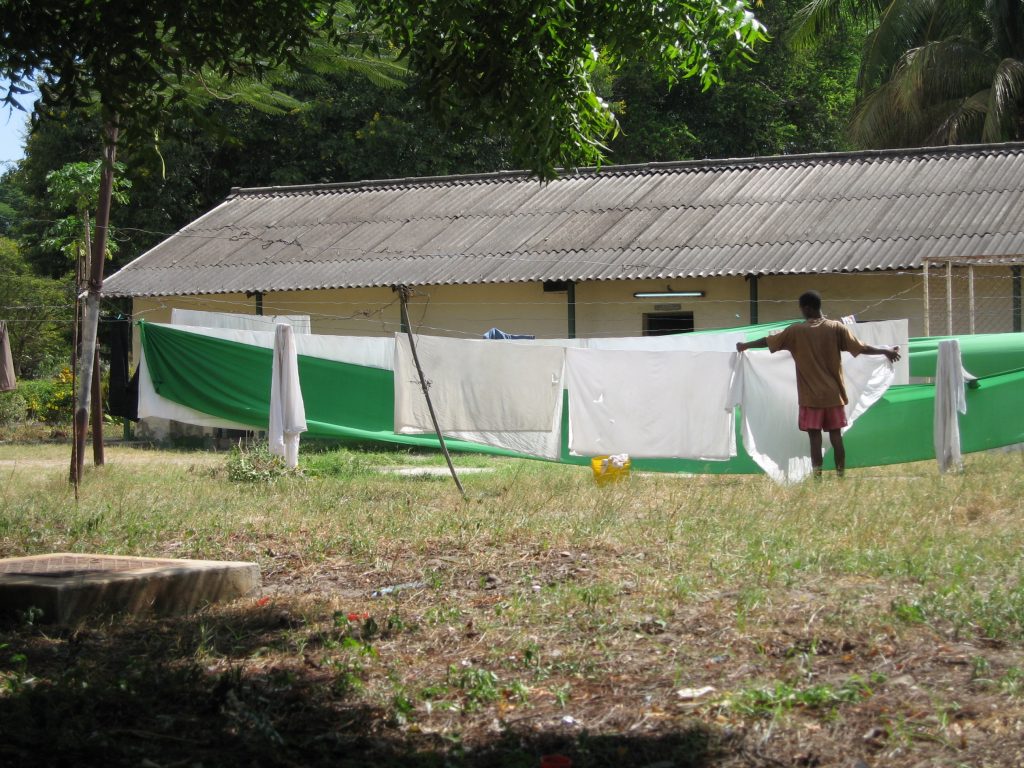
NOTES ABOUT SWAHILI
The Swahili day has 12 daylight hours followed by 12 night hours. The new day begins at sunrise, or 6:00 in the morning. The night cycle begins at 6:00 in the evening/sunset, approximately.
NOTE! (which can be very confusing) there is a 6 hours difference between Swahili time and European standard time. When you in Swahili say that the time is 5 minutes to 4 (saa nne kasoro dakika tano), then you have to calculate 4 PLUS 6, consequently the time is 5 minutes to 10!!! It takes time to be used to this… In Swahili days of the week are named according to the Arabic system, which means that the first day of the week is Saturday and the last day is Friday. When you in Swahili will book a meeting on a certain date, such as 17-12- 1994, you need to say; (date = 10+7, month,
year = number of thousands + number of hundreds + 90 + 4) tarehe kumi na saba Desemba elfu moja mia tisa tisini na nne! This plus lot’s of other thing’s to learn in one week.
My brain will soon have a hard disc crash… or at least melt down in this heat.
It happened again!
I met 2 girls from Sweden who is staying at Tabora located in the Singida region, we will be in that region from March 6th to April 1st so maybe we will meet again. The girls originated from a school in Sweden named Viback in Smaland, and one of the girls was living in Stenungsund outside Gothenburg not far away from where I live. She immediately asked me if I was from Gothenburg, which I could not deny due to the specific dialect. Sweden’s population must be decreasing, so many Swedes I have met during this short time 🙂
Today is the hottest day so far, extremely hot, somewhere between 35-40 degrees and high humidity. Even the natives avoided the sun and heat. Our teacher had earlier proposed that we could have lessons at South Beach but this was not possible in this heat. At 13.30 we stopped the lessons and went back to our air conditioned hotel, thank god! In Dodoma and the hotel there,
they have only 2 rooms which are air conditioned, hopefully these are available. The afternoon and evening we updated our expense reports and planned our upcoming trip to Dodoma.
Tomorrow we will have our last meeting at WFP Country office and in the evening we will be at Karla’s house as she invited us again.
* Monday January 30th, 2006 *
Hard to believe, but this is the last day attending the Swahili school. I must admit that it has been a hard time to learn a completely new language in a week. Well, maybe not to be able to speak fluently and read, but the intention is to have some understanding of the language. This is especially important as we are going to be in some rural areas where as speaking English not are common at all. In these cases, we do need to know the language more than zero. We now need some practicing and without doubt, this we will get.

We had earlier this week handed over a list of questions to our teachers, as they were going to help us translate these into Swahili. Those we are to use doing interviews with teachers and headmasters enabling us to find out how they fulfill the reporting back to WFP, how the food is stored, rotation of the food, number of children having daily breakfast, etc. The basic Swahili can also be most useful when holding lessons in school, which we also are going to do.
NOTES ABOUT SWAHILI
One of the things learned, which I mentioned in my earlier reports, is the importance to say a word correctly or to spell it right. If you miss a character in a word and suddenly it will have another meaning. Following is just two examples which can cause an embarrassing situation.
•The word “kunywa” means “drink”, if you write or say “kunya” instead; it means something you do in the toilet.
• The word “Jambo” means “Hello”, if you write or say “Jamba” instead, this
means “farting”
Consequently, which is valid for all languages at all times, think of what you are saying and say it very clearly to avoid misunderstandings.
Yesterday I told you the story about what I found in my coke. I told my teacher the very same history. She then said to me; I do not know how you will take this… but for some years ago I visited my sister in Arusha as she got a baby. While there, I had a coke and had some glasses until I saw what’s in the bottle at the bottom. It was not coke, but starts with the same characters co****e. This story is a bit scary, and so disgusting that it is not appropriate to tell you the story in this forum. But if you want to hear it, just ask me, I will not forget that story and I will for sure not drink any more coke in this
country.
Tonight we are invited to Karla’s place. As we were in WFP Country office this afternoon, sending reports, checking the mail boxes, etc. Karla took us directly from the office to her place.
She lives not far away from the office, the northern part of Dar. This is the place where all the diplomats live. One of Karla’s next door neighbors is the prime minister. The house is surrounded by concrete walls and fences, which are most common in these areas. The gate is opened by guards and we can
enter. Inside are her two dogs, one of her own, named Ceasar, and another one which is a foster-dog. Caesar is a boxer and two years old and wants to say hello and play. He jumps on me and licking me frequently, my trousers
looks at the end that one must think that I have been crawling in the mud…
It is really a beautiful house with lovely trees, such as mango, banana, cashew nuts, etc. Some other friends of Karla are already here, Peter and Martina from Italy. We had some drinks and dips outside on the deck; it is still approximately 30 degrees outside.
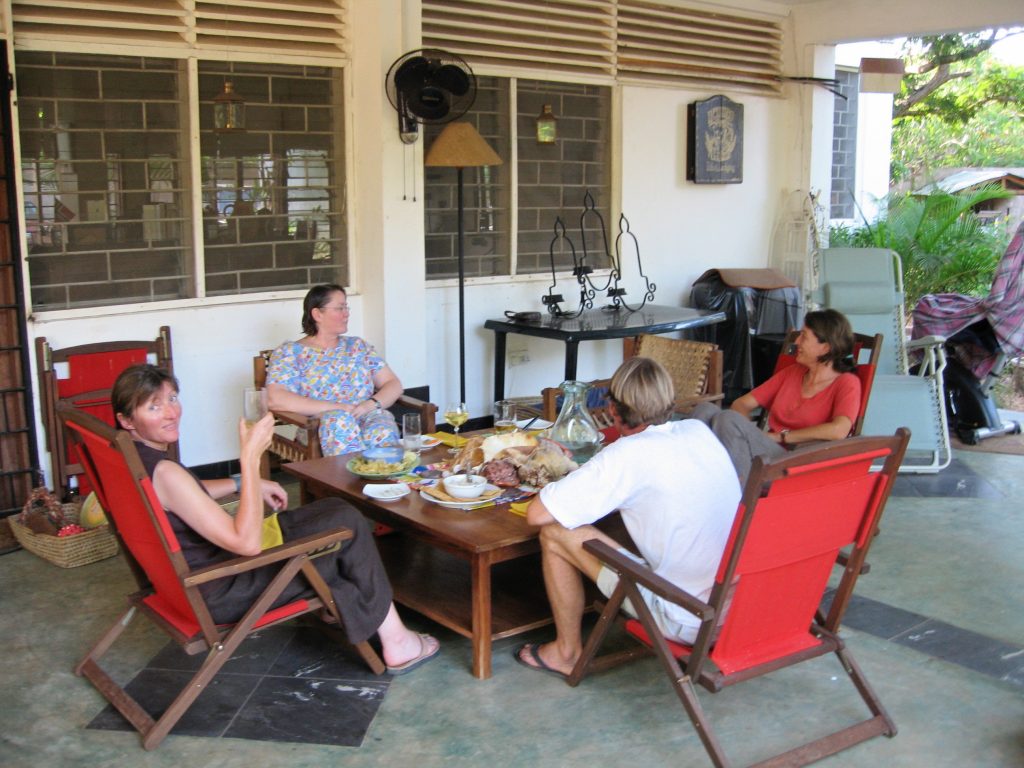
Janet, Karla, Martina & Peter 
Martina, Peter, Janet & Karla
We all enjoyed the heat and each others company. We are being served absolutely fantastic spinach lasagna together with salad and garlic bread. Thank you Karla, this was a perfect last evening in Dar before heading off to Dodoma.
